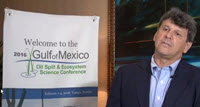The A Combined Analytical and Synthetic Approach Based on Line Narrowing Spectroscopy for Specific Isomer Determination of Petroleum Oil Spills project is lead by P.I. Andres D. Campiglia, University of Central Florida.
This proposal tackles a different aspect of PAHs analysis as it focuses on detection and characterization of higher-molecular weight PAHs (HMW-PAHs), i.e. PAHs with MW equal or higher than 302 g mol-1. The HMW-PAHs isolated from environmental and combustion-related samples exhibit mutagenic activity and petroleum transformation products from HMW-PAHs persist in the environment longer than their lighter counterparts.
Studies have shown significant sedimentation of HMW-PAHs that may be increased with the addition of dispersants in a coastal setting. Their continued monitoring will ensure that HMW-PAHs present in sediments are not being redistributed and accumulating through the food chain.
When compared to un-substituted PAHs, APAHs comprise a relatively large fraction of the total number and mass of PAHs found in crude oil and crude-contaminated seafood samples. Sulfur is the principal heteroatom in coal, crude oil, tar and their by-products. Thus, to fully understand the environmental implications of the DWH accident, the ideal technique should be able to determine isomers of APAHs and PASHs
The specific research goals are the following: (a) unambiguously determine HMW-PAHs with MW 302 in complex environmental extracts from the Gulf of Mexico using the multidimensional laser excited time-resolved Shpol’skii spectroscopy (LETRSS) technique; (b) synthetize pure standards of MW 302 currently unavailable from commercial sources; and (c) extend the developed approach to the analysis of specific isomers of HMW-PAHs with MW > 302 including alkylated PAHs (APAHs) and sulfur containing PAHs (PASHs).
Click for access to GoMRI’s YouTube videos of RFP-V Projects…
************
This project was funded by the Gulf of Mexico Research Initiative (GoMRI) in the RFP-V funding program.
The Gulf of Mexico Research Initiative (GoMRI) is a 10-year independent research program established to study the effect, and the potential associated impact, of hydrocarbon releases on the environment and public health, as well as to develop improved spill mitigation, oil detection, characterization and remediation technologies. An independent and academic 20-member Research Board makes the funding and research direction decisions to ensure the intellectual quality, effectiveness and academic independence of the GoMRI research. All research data, findings and publications will be made publicly available. The program was established through a $500 million financial commitment from BP. For more information, visit http://gulfresearchinitiative.org/.

